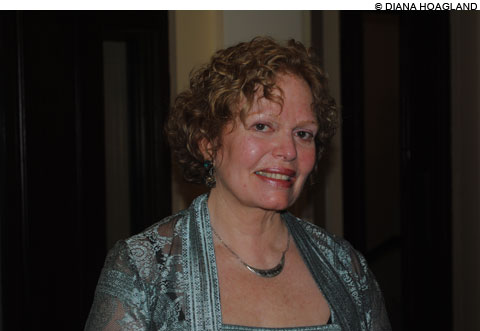
WELCOME BACK! Soprano Diana Hoagland returned to Boston to re-create her role in a fragment
from Leon Kirchner’s opera, Lily. |
Leon Kirchner's Lily, wasn't the only opera to have a disastrous premiere (some now-indispensable Verdi and Puccini were opening-night failures). The ink was barely dry on the page when the curtain rose on Lily at the New York City Opera in 1977. Neither the singers nor the orchestra had really absorbed the complete score. And this work, based on Saul Bellows's novel Henderson the Rain King, got a production that was staged (evidently in a totally alien Broadway style) by Tom O'Horgan, famous for Hair and Jesus Christ Superstar. The New York Times called Lily "stillborn."
But Kirchner (who died in 2009 at the age of 90), always regarded it as the crowning work of his career. It's certainly his most ambitious undertaking and his only opera. Fortunately, there was a recording (now reissued on Albany Records) of a 20-minute chamber version Kirchner put together for the summer music festival at Marlboro, Vermont, in 1973. And now cellist Laurence Lesser, artistic director of the New England Conservatory's First Monday concert series, who performed in the Marlboro premiere, made sure we got to hear it live. (The concert began with a vigorous, warm-hearted performance of the Swedish-German/Southern Californian composer Ingolf Dahl's Music for Brass Instruments, which quotes the main theme of Bach's Cantata No 4, Christ lag in Todesbanden, followed by the Bach cantata itself. All the pieces were played without a conductor, though the Bach, with its unsettled balances and tempi, could have used one.)
The abbreviated Lily is a marvel of invention and intense evocation. It begins with a haunting flute solo, a long cadenza (played here by the phenomenal Sooyun Kim), with crepuscular rustlings of wind chimes and other eerie wisps of percussion (Robert Schulz). Then we hear the incantation of the African princess Mtalba, singing in a language invented by Kirchner himself.
The part was first sung at Marlboro and again on the recording by a remarkable Boston soprano named Diana Hoagland, who dropped off the Boston radar screen when she moved to Connecticut more than 30 years ago. I'll never forget her glistening, poignant Countess in a concert version of Mozart's Marriage of Figaro, conducted by composer Earl Kim, or her eloquent performance of the Boston premiere of Elliott Carter's Elizabeth Bishop song cycle, A Mirror on Which To Dwell, with Richard Pittman's Musica Viva. Hoagland had a radiantly beautiful voice and a gift for the most warmly natural communication of text. And she still has both! Mtalba's melismatic chant soars to a high F, which Hoagland delivered with astonishing fullness and accuracy, but she also made us feel Mtalba's uncanny and scary allure. What a pleasure to hear her again.
And how amazing, too, that among the 11 musicians at this performance were violinist James Buswell, celebrated clarinetist Richard Stoltzman, and cellist Lesser, brilliantly repeating their original performances.